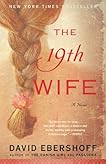 It feels like a long time since I last posted about a book that I read. Which is not because I haven't been posting. Nor is it because I haven't been reading. The book I was working on was just a really slow read for some reason. Enjoyable, but not the light fiction I had envisioned when I first picked it up.
It feels like a long time since I last posted about a book that I read. Which is not because I haven't been posting. Nor is it because I haven't been reading. The book I was working on was just a really slow read for some reason. Enjoyable, but not the light fiction I had envisioned when I first picked it up.I read about The 19th Wife in, of all places, the monthly Costco magazine. The subject matter - part mystery, part religious history - struck a chord and I went on a hunt to find the book. My mom found it first and read the copy before I could get to it. She enjoyed it, I think, but significantly less than I did. For her, she was tired of the subject matter. For me, the subject matter was completely unfamiliar and therefore fascinating.
So, what is the subject matter? Polygamy and the Mormon Church. The story follows two timelines: the mid-1800s during Brigham Young's lifetime and today. In both timelines there is a 19th wife, a woman who is one of a number of sister wives. The historical story revolves around a real individual who married Brigham Young then later divorced him and brought polygamy to the attention of the American public and the American government. The present day story revolves around a member of the Firsts (the polygamous cult in the Southwestern US who made national news two years ago) accused of killing her husband.
I was deeply fascinated because the book made me realize I know absolutely nothing about the Latter Day Saints, really. I am curious how a practicing Mormon would respond to Ebershoff's book. He does not paint historical Mormonism in an uplifting light but he does portray current day Mormons much nicer (that seems like a very blanket, blah term but it seems apropos). He spends a significant amount of time attempting to explain the schism between the Mormons and the Firsts and acknowledging that the two groups are far from the same. Yet, because of the history he tells there is an obvious shared timeline.
I also found the organization of the story unusual. The contemporary timeline reads like a traditional novel. But thrown in between are chapters that read more like historical sources that a scholar would use to do research - including a very apt Wikipeda entry. On the one hand, it slows the book down because there is a continual jump in character and style of writing between the past, the present, the scholarly, and the novelistic. On the other, it gives a weightiness to the story because it is very obviously based in fact.
Ebershoff does admit that his historical sections are fictional recreations based on fact as opposed to historical "Truths". As I said earlier, this book made me want to read more. I would love to take his story and weigh it against other scholarly sources to see how they compare. And, I would love to get an 'insider's' impression of what Ebershoff has depicted of the history of Mormonism.
1 comment:
Jehnie, you might like, "Under the Banner of Heaven," if you liked this subject matter. I was fascinated too. I might pick this up now. UTBOH was based on a true story, and you will even reconize some names from some recent news events.
Post a Comment